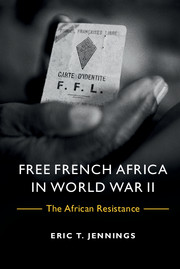Epilogue
Published online by Cambridge University Press: 05 August 2015
Summary
Can the memory of World War II in Francophone Africa be disentangled from that of the colonialism more broadly? Although the Free French period introduced changes in scale, it did not bring about as many shifts in kind. Take Edgard de Larminat's insistence that he retain the “machine” he inherited in 1940, and simply focus on increasing its yield.
Many researchers have examined the memory and afterlives of the French empire in Africa. Jennifer Cole notes that in northwestern Madagascar ritual sacrifices serve to reverse the effects of colonization. This involves rewriting the colonial era while siphoning agency, authority, and domination from the colonial authorities to transfer them to the ancestors of the colonized. Achille Mbembe posits that in Cameroon the colonial period was experienced through the prisms of disease and misfortune. People grappled with it through this same interface, which is to say the allegory of cure and recovery. Cole adds that the memory of colonialism can be likened to a subterranean river, invisible for the most part until it periodically bubbles up to the surface. These readings are in some ways reminiscent of the so-called Vichy syndrome identified by Henry Rousso. Indeed, like the latter, the memory of colonialism has proven to be at once ubiquitous, variable, malleable, and usable.
Schemes of resistance and collaboration were polysemous in the setting that concerns us, given that the colonial era was overlaid with a Free French one. Thus, one could be simultaneously an African collaborator with the French and a Free Frenchman resisting the Axis. Or conversely, one could be a Cameroonian Germanophile resisting the Gaullist war effort.
Does this mean that one can discern a memory specific to the Free French episode in Africa? The Gaullist years have been regularly evoked, both before and after the decolonization wave of 1960. In the 1950s, General de Gaulle reactivated a myth born around 1944. In the words of Henry Rousso the myth in question ran as follows: “The history of France from 1940 to 1944 had been made in London and Algiers”.
- Type
- Chapter
- Information
- Free French Africa in World War IIThe African Resistance, pp. 249 - 272Publisher: Cambridge University PressPrint publication year: 2015



